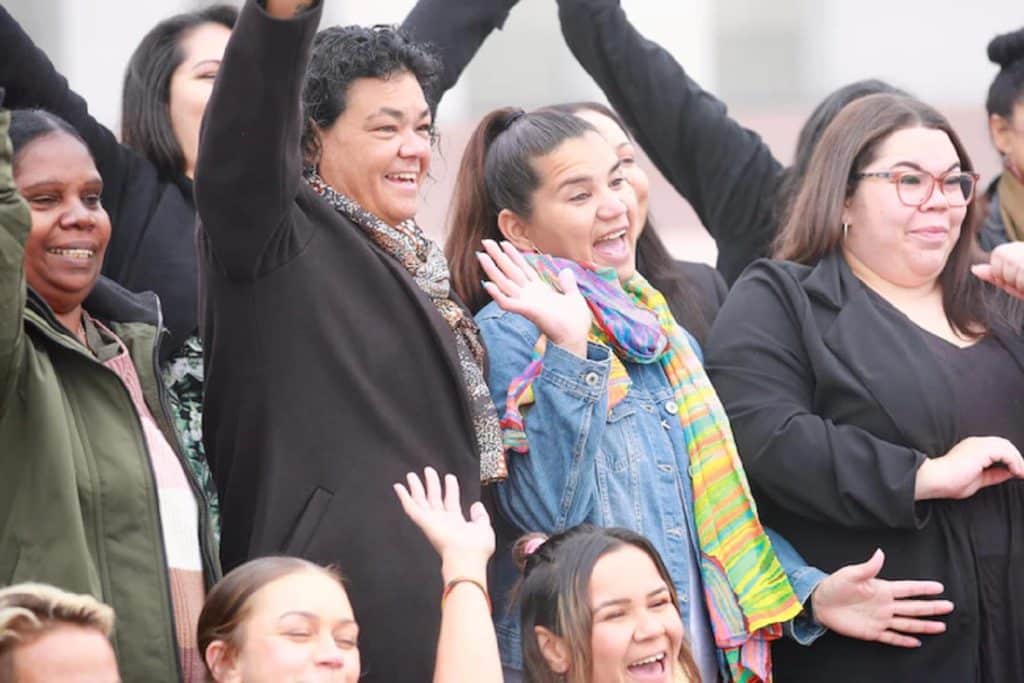More than 50 First Nations women from across Australia attended Oxfam Australia’s Straight Talk National Summit in Canberra last week, with many saying they left feeling ready to build on their community advocacy work and create powerful change.
The five-day summit runs every two years and aims to support First Nations women in gaining valuable insights into political processes, while also build on their skills to create positive change in their communities.
Due to Covid-19, the summit had a three year hiatus, but was back in full swing this year to provide networking opportunities and useful resources for those invited to attend.
It was an especially significant event given the record 11 First Nations MPs in Parliament elected this year and Linda Burney’s appointment as the first Aboriginal woman appointed as Minister for Indigenous Australians.
Attendees were able to sit down with Parliamentarians, develop more tools to engage with the political system and establish strong relationships.
“Straight Talk supports Aboriginal and Torres Strait Islander women to amplify their voices and realise their right to self-determination– ensuring that they have a seat at the table to make decisions about the things that directly affect their lives and communities,” says Executive Lead of Oxfam’s First Peoples Program and proud Wamba Wamba, Yorta Yorta, Dhudhuroa and Dja Dja Wurrung woman Ngarra Murray.
This year, the attendees represented women from many different nations and language groups, ranging in ages from 20s up to 60s.
The summit’s official opening ceremony was hosted at Parliament House by the Minister for Indigenous Affairs, Linda Burney.
During the five days, Kuka Yulanji woman and 2015 NAIDOC Scholar of the Year, Michelle Deshong, led attendees in small group meetings with politicians and helped them engage in a mock Senate committee.
Yamatji-Noongar woman and WA Senator Dorinda Cox, and Senate President Sue Lines, spoke at the summit, while special guest speaker, Karen Diver, also spoke, sharing her experiences as US President Barack Obama’s Special Assistant to the President for Native American Affairs.
Cox said Straight Talk is not only beneficial for the attendees but also for the MPs they meet with.
“Straight Talk provides an important opportunity for us as politicians to understand what some of the barriers and the challenges are for First Nations women participating in politics and how, from a grassroots democracy perspective, we can engage better.”
Since it began in 2009, the Straight Talk summit has hosted more than 950 Aboriginal and Torres Strait Islander and many have gone on to create positive change within their communities and beyond.
Program facilitator, Michelle Deshong, has been with Straight Talk since its beginning and says that, originally, they were trying to encourage more Indigenous women to step into political spaces.
“I think a lot of the time people are trying to enact change, but sometimes they don’t know where the right place is to start or who the right people are in terms of the decision makers they need to be talking to.”
Throughout the years, Straight Talk has seen many women put the insights they’ve gained at the summit into practice in their communities by running for political office and local government.
Many are already strong advocates in their community politics and the conference allows them to add to this activism by learning more powerful strategies from other First Nations women.
“I know that I have a strong voice but let me tell you, there were some women there that had much stronger voices than me,” says one of the attendees, Kaurna and Arabunna woman, Janette Milera.
“I am seriously looking at how I can move from the community activist […] to a much stronger voice and a more powerful voice that will actually help make change.”
Another attendee, Ngarrindjeri woman Shaylem Wilson sees the summit as a valuable way to receive guidance from women who’ve overcome similar struggles to getting into politics.
“As a young First Nations woman, I feel honoured that other women from across the country shared their knowledge, strength and power.”


